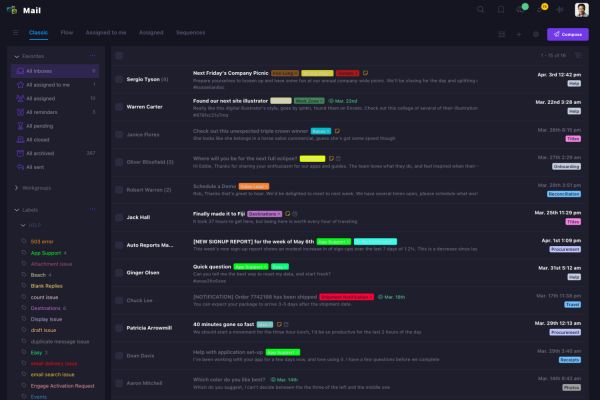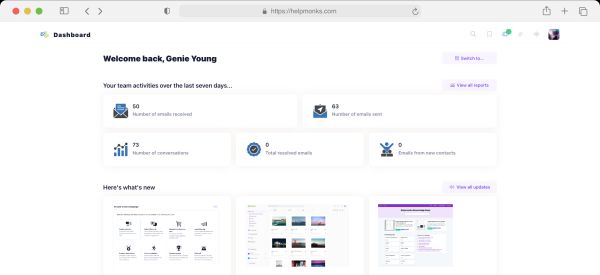
Introducing new pricing for Helpmonks
Discover Helpmonks' new pricing structure, featuring a flexible PRO plan, a FREE plan for smaller teams, and an exciting affiliate program. Experience unparalleled email management solutions today!
Read nowIf you want your business to succeed, you can't overlook the importance of efficient customer service. Part of this service is attending to any issues that customers may have, professionally and timeously.
That's why help desk software typically includes a ticketing system. This is a software solution that monitors and manages all of your incoming customer service requests, queries, and complaints. But is ticketing software the ultimate solution, or does it create problems of its own?
Get to the bottom of this issue in the guide below. We examine the pros and cons of ticketing systems, and how to make the most of them. Read on and learn how to offer the customer service that sets you apart from the rest.
A ticketing system, also known as a support ticket system or help desk system, is a software solution designed for the management of customer support issues. Customer support requests come in, they are assigned 'tickets', and further categorized. This can all be managed from a central dashboard.
While this sounds very simplistic, it has far-reaching effects. The ticketing system is the hub from where all your customer service processes reach designated staff. Any breakdown in this chain will have a large impact on your handling of these processes.
A ticketing system relies on various software features and automated tasks to assign tickets for customer service issues, queries, complaints, and more. These tickets are routed to customer service agents, who systematically handle these issues from there, in the order assigned.
A support ticket system offers several advantages, not only for your team but also for your customers. Here are six top advantages that businesses will enjoy.
An effective help desk system enables customer service teams to handle a higher volume of tickets than they could alone. It can also route specific categories of customer service tickets to predetermined teams or team members. This facilitates interdepartmental collaboration.
With a ticketing system, no customer's queries are left unresolved. Every query is assigned a ticket number, and they are dealt with systematically. This ensures that no requests go missing in the mix, and none are overlooked.
By tracking your ticketing system metrics, you can monitor the performance of both your ticketing software and your customer service representatives. This will give you insights into where more training is needed, or where customers feel you are failing them.
You can also narrow the focus of your data tracking even more if your help desk system works on multiple platforms including social media. You'll quickly be able to identify which channels customers prefer for support.
A help desk system offers a centralized knowledge base, with all ticket-related information stored there. This is ideal for team members who in the future can access the historical data they need to resolve current customer support problems.
One of the top benefits of ticket-based CX software is how it reduces wait times for customers. Their queries are addressed and resolved faster. Customers won't have to wait on the phone for an agent to become available. This boosts your team's efficiency, as they can move on to the next customer query sooner.
It also enhances your customer engagement and satisfaction, as they don't have to wait long for their query to be answered. Prompt resolution is one of the best ways to increase customer engagement.
When customer service issues are addressed more quickly and efficiently, it improves customer satisfaction and their view of your service. This in turn increases customer loyalty, as they see you as a business that can resolve their problems.

Unfortunately, support ticket software can also have disadvantages. When your system fails your customers, it makes your team's jobs more difficult. And when your team finds it difficult to use, it can lead to slow and inefficient customer service.
Although help desk software is designed to improve customer service, many systems come with complex processes, and thus a much higher learning curve. This requires more training of staff before you can implement it.
A help desk system can be costly to implement and manage. The costs vary from one software package to another, but it is still an expense that has to be justified. Your business's budget will, of course, dictate how much you can spend.
Although some help desk systems may be flexible, many are not customizable. Every business is unique, which means some of your customer service issues will be unique to your industry. A lack of flexibility will mean that certain customer service categories are not adequately addressed.
Customers need to know that they can talk to someone and get help right away. A ticketing system doesn't usually offer customers communication features that operate in real time. This means that the resolution of customer complaints is delayed, potentially worsening the situation.
This is where other customer engagement and email management software like Helpmonks are helpful, with real-time communication features, like live chat. It helps you to solve problems faster, and maintain your company's reputation.
Customers may prefer communicating with support teams via more traditional email systems rather than a ticketing system. This is especially true for senior customers, and those who are unfamiliar with or less confident about technology.
Integration difficulties are yet another disadvantage of help desk ticketing software. When your system can't integrate with other software and online tools your team needs, your workflows will be interrupted, and customer service will decline.

Do the disadvantages mean that you have to do away with your ticketing software? No, not at all. But to maximize your customer service processes, consider integrating complementary software that boosts those pros while eliminating the cons.
Helpmonks is not a ticketing system. It is a shared inbox tool that can complement existing ticketing, help desk, and CRM stacks. By integrating Helpmonks with your customer service platform and ticketing system, you maximize their potential.
With all customer interactions in one place, collaborative inboxes, and automated workflows, Helpmonks will fill in the gaps in your current customer service system. So, even if you have a support ticket system in place, complementing it with the right supportive software will give it a boost.
Few businesses operate successfully without a dedicated support ticket system, help desk, or CRM. But most ticketing software has as many disadvantages as advantages. Fortunately, you can eliminate many of the problems by integrating your ticketing system with complementary software.
Helpmonks is an all-in-one customer engagement platform. Our software caters to the email management, marketing, CRM, and customer service needs of businesses of all sizes. Yet it is simple to implement, user-friendly, and affordable.
Our shared inbox email management features address the problems of ticketing systems, and provide the perfect integration for your help desk software. Create an account today to enjoy a 30-day free trial!

Discover Helpmonks' new pricing structure, featuring a flexible PRO plan, a FREE plan for smaller teams, and an exciting affiliate program. Experience unparalleled email management solutions today!
Read now
Dynamic email signatures increase brand visibility, build brand identity, and boost conversions. Learn how to create and update dynamic email signatures.
Read now
Looking for an email marketing automation software? This guide shows what to look for. We'll also review the best tools for your online marketing needs.
Read now
Using customer engagement solutions helps you keep your existing customer base and grow. Here are the top 10 customer engagement solutions for your business.
Read now
Empower your team and delight your customers.
